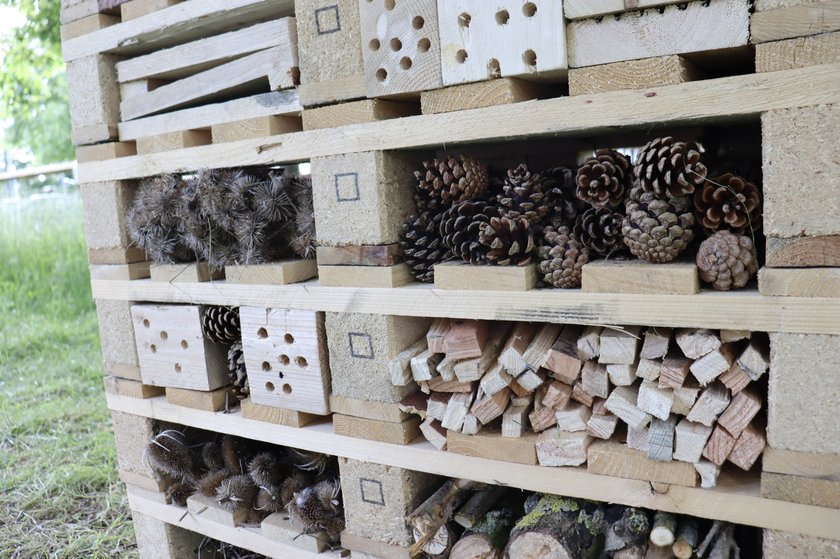Planting for pollinators and creating a home for mini-beasts are part of a biodiversity action week at Addenbrooke’s and the Rosie, to give nature a helping hand.

A team of young adults from Switch Now, a local alternative education and training provider, have been working with the sustainability team at Cambridge University Hospital NHS Foundation Trust (CUH) to create a new habitat for wildlife.
The team, made up of young adults with learning difficulties and disabilities, are building a bug hotel for a new wildlife garden near the entrance to the Rosie Hospital.
Biodiversity around the world is declining due to mass habitat loss and climate change. CUH has joined the fight by actively creating spaces that support our local biodiversity.
Katie Sell, sustainability manager
Switch Now co-workers first visited the site in early May to measure up and plan where to build the hotel. They thought about what insects and other creatures would need from their new home and where it should be built.
Since then they’ve worked on the bug hotel in their workshop in St Neots, visiting the new wildlife garden to put in the base and build the frame. And gathering pine cones and other materials to help the insects feel at home.

The bug hotel creates a safe space for mini-beasts such as ladybirds, bees, woodlice and spiders to shelter, hide from predators and raise their young. These creatures are vital to the health and wellbeing of gardens.
Rachel Northfield, head of corporate support and sustainability, praised the Switch Now co-workers, saying:
We want to thank the co-workers for their amazing work on the new bug-hotel – which any woodlouse or solitary bee would be delighted to stay in.
Adding: "Working with community organisations like Switch Now helps us champion biodiversity and support young people to develop vital skills that will help them in their future lives."

Catherine Fairholm, Director of Switch Now, said: “Switch Now are delighted to have been involved in this biodiversity project.
"Working on community projects like this helps our co-workers develop skills to help them build communication, organisation and social skills, along with the necessary work skills to help them progress towards employment and realise their potential.'
Learn how to build your own bug hotel (opens in a new tab) with this guide from The Wildlife Trust for Beds, Cambs and Northants.
The sustainability team have also installed nine new bird roosters around the CUH site as part of the wildlife garden project.
The enriched garden space will ensure that local species, be that a nesting robin or a colony of woodlice, can find a safe place to call home.
Katie Sell
As part of the biodiversity week of action, CUH staff and volunteers also planted nectar-rich flowers into 10 pre-filled planters on the hospital site.
This was the brain child of Jen Bailey, a medical secretary in the East of England cleft lip and palate service based at Addenbrooke’s, who said:
“When I found a number of bees that had perished on my walk through campus to work, I realised that there were no flowers nearby that could have given them the nutrients that they perhaps needed.
"I knew that I had to help keep them buzzing. Additionally, I thought that helping our friendly pollinators with planters containing wild flowers would complement the CUH Think Green campaign, along with adding some cheerful scenery for staff and patients who shall come across them.
"I am so very proud, grateful and happy that we are helping our VIBees!”
The bee planters were funded by Addenbrooke’s Charitable Trust (opens in a new tab).

Our green plan
Climate change and the loss of biodiversity pose a major threat to the natural world we live in. Cambridge University Hospitals NHS Foundation Trust (CUH) is taking steps to reduce its carbon footprint and increase biodiversity as part of its green plan.
This sets out how the Trust will save more than two thousand tonnes from its direct carbon emissions by 2024 and become a net-zero organisation by 2045. Find out more about CUH's green plan.


